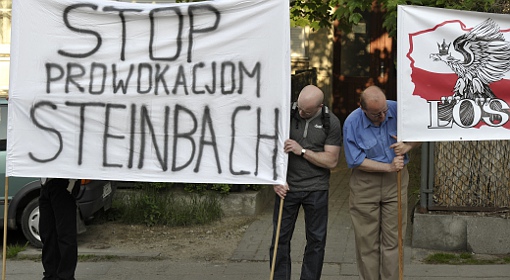
Baner against Steinbach visit, photo: PAP
Steinbach met in Gdansk (
Danzig) with around 50 members of the German minority in Poland and called for Germans and Poles “to engage in dialogue and reach agreement”.
A small group of protestors stood outside the German consulate in the Baltic city with banners that read, “Stop Steinbach provocations”.
“We are protesting this visit because, for us, this lady is persona non grata,” opposition Law and Justice party senator Dorota Arciszewska-Mielewczyk told the PAP news agency.
Steinbach dismissed the demonstrators as “Polish nationalists”.
Steinbach, an MP for the ruling Christian Democratic Party (CDU) in Germany, has long campaigned for the commemoration of the suffering of up to 16 million Germans expelled from Poland and other Central and Eastern European countries after the end of WW II.
Steinbach’s many critics in Poland say she is trying to re-write history, however, in an attempt to paint suffering experienced by Germans as being morally equivalent to the plight of Jews and Poles at the hands of the Nazis.
The Polish government protested last year against a proposal to appoint Steinbach as a director at the planned Centre Against Expellees in Berlin, a state-backed museum which will document the experiences of displaced Germans following the war.
Steinbach - born in Rumia (now Gdynia, northern Poland) in 1943 and the daughter of an officer serving in WW II Nazi occupied Poland - first caught attention when she voted in the Bundestag in 1991 against recognising the Oder-Neisse border between Germany and Poland, established in 1945 following the Yalta and Potsdam conferences.
The German politician, who has a higher profile in Poland and the Czech Republic than she does at home, is currently leading a visit by a human rights delegation from the CDU party.
Hometown visit
On Monday, the 67 year-old Steinbach will visit her hometown, which she fled with her family in 1945 as the Red Army advanced into Poland.
Steinbach will also lay a wreath at the cemetery in Wielka Piaśnica, 50 kilometres from Gdansk, in memory of up to 16,000 Poles, Jews, Czechs, and German inmates of mental hospitals, who were murdered by the Nazis in the early months of occupation between autumn 1939 and spring 1940.
Steinbach’s trip to Poland comes just days after Polish, German and French foreign ministers met in Bydgoszcz, northern Poland, for talks under the Weimar Triangle umbrella, following an agreement signed in 1991 to strengthen ties between the three nations. (pg)